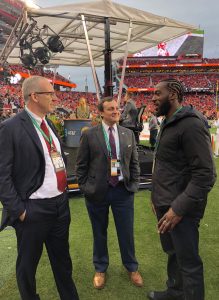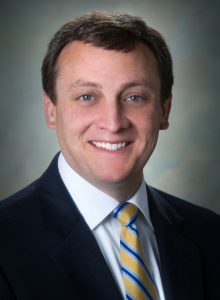
Southeastern Conference Commissioner Greg Sankey (left) and Deputy Commissioner Charlie Hussey, a 1999 University of Mississippi graduate, speak with Ole Miss football great Patrick Willis before the 2019 College Football Playoff championship game in Santa Clara, California. Submitted photo
OXFORD, Miss. – University of Mississippi alumnus Charlie Hussey recently became the Southeastern Conference‘s deputy commissioner after spending the last few years overseeing the overwhelming success of the SEC’s television network.
Hussey, who grew up in Oxford, earned a Bachelor of Business Administration from Ole Miss in 1999 and went to work for the SEC the next year, said he enjoys his work.
“I enjoy interacting with the all of the great people on the SEC’s 14 campuses, our media partners and bowl representatives, and working through the many different challenges and opportunities that are presented each and every day,” he said.
He became the SEC’s chief operating officer, which includes leading the day-to-day operations of the conference headquarters, in February 2017. He will continue performing those duties in his new role as SEC deputy commissioner.
Hussey previously was the SEC’s associate commissioner for network relations since 2013 and was the conference’s point person on the creation of the SEC Network, which launched in 2014. Walt Disney Co. CEO Bob Iger stated that the SEC Network was one of the most successful cable launches in the history of paid TV.
The channel, developed by ESPN, airs SEC content around the clock, including 45 SEC football games, 100 men’s basketball games, 60 women’s basketball games, 75 baseball games, 50 softball games and additional events from the SEC’s 21 annual sports each year.
The last annual reporting of revenue from the Southeastern Conference, which came in late January, was more than $624 million, which means an average of about $44.6 million for each SEC school.
The total distribution amount comprises revenue generated from television agreements, post-season bowl games, the College Football Playoff, the SEC Football Championship, the SEC Men’s Basketball Tournament, NCAA Championships and a supplemental surplus distribution.
Beyond the revenue created for each school, Hussey said he’s proud with the level of programming the network has been able to offer.
“The SEC Network has exceeded expectations in terms of the programming and the high-quality content that we put on each and every day,” Hussey said.
In his new role, he will continue to be the conference’s liaison with ESPN and the SEC Network for all television and sponsorship matters.
SEC Commissioner Greg Sankey announced Hussey’s promotion in December, calling him a strong leader who spearheaded many successful conference initiatives.
“He has developed strong relationships with campus leaders, media partners and many others throughout intercollegiate athletics,” Sankey said. “As the landscape of college athletics continues to evolve, our conference office staff is well-prepared to meet new expectations, and Charlie is poised to play a critical leadership role as we look to our future.”

Charlie Hussey, deputy commissioner of the Southeastern Conference, also serves as the SEC’s chief operating officer, which includes leading the day-to-day operations of the conference headquarters. Submitted photo
Hussey credits his boss for his strong leadership and vision for the conference and praises the SEC’s staff for their teamwork and attention to detail.
Current SEC members Ole Miss, Alabama, Auburn, Florida, Georgia, Kentucky, LSU, Mississippi State, Tennessee and Vanderbilt, in addition to former members Georgia Tech, Sewanee and Tulane, were charter members when the conference was founded in 1933. Two different expansions – one in 1991, which added Arkansas and South Carolina, and the addition of Texas A&M and Missouri in 2012 – brought the league to its 14-team size.
SEC fans have a reputation for being more passionate than most college sports fans. Hussey believes that’s true and his theory about why that is goes back to the makeup of the sports landscape of when the conference was created in the 1930s.
“There was a tight contiguous group of SEC teams when were founded in 1933,” Hussey said. “And so you had friends or family rooting for another team that was close by and thus, rivalries were born.
“In addition, as professional teams came of national interest, there were not many inside our footprint and so our fans rallied around college teams and fortunately that passion has carried on.”
Hussey and his wife, Lindsay, met in Birmingham and live in the suburb of Mountain Brook, Alabama. They have three children: Olivia, Charles and Maddie.
He is the son of Charles L. Hussey, UM associate dean for research and graduate education and distinguished professor of chemistry and biochemistry. The younger Hussey grew up in Oxford with his dad working on campus. He looks back fondly on his youth in the town where he had his first taste of college athletics.
“Oxford was a great place to grow up,” Hussey said. “After elementary school, I would ride my bike all over campus and catch different practices, whether it be football, basketball or baseball. Being around college athletics at an early age certainly played a factor to my career today.”
Chancellor Emeritus Robert Khayat remembers Hussey when he was still a young, reserved boy with a winning smile growing up around Ole Miss athletics.
“I am not sure if he was shy, but he seemed to hang back a little before launching in with total commitment,” Khayat said.

Charlie Hussey (left) and his wife, Lindsay, enjoy the aftermath of an SEC football game with children Olivia, Charles and Maddie. Hussey is a 1999 University of Mississippi graduate who was promoted to deputy commissioner of the Southeastern Conference. Submitted photo
When Hussey was finishing at Ole Miss, Khayat and the Husseys were friends, and so Khayat had kept up with him. When he noted Hussey’s interest in college athletics, he decided to put in a good word for him with then-SEC Commissioner Roy Kramer.
“I have followed his work at the conference office, and the level of respect for him has continued to increase through the years,” Khayat said. “Charlie is one of those young men who had a plan for his life, and he seems to be living the dream of fulfilling that plan.”
Though he also holds a master’s degree in business administration from the University of Alabama at Birmingham, Hussey credits Ole Miss with helping him prepare for a career in athletics.
“Ole Miss provided the foundational concepts and skills that I use today; however more than that, I had the opportunity to interact with many different people and build contacts and friendships that will last a lifetime,” Hussey said.
“In terms of pursuing a career in athletics administration, Dr. Khayat, former faculty athletics representative Dr. Max Williams and former Associate Athletics Director David Wells were key in helping me obtain my first opportunity at the SEC in the summer of 1998 as an unpaid intern.”
He would advise any student who wants to pursue a similar path to hone basic skills such as writing and communications, as well as find opportunities to gain as much experience in athletics as possible, whether through internships or volunteer opportunities.
“The demand for people to work in athletics exceeds the supply of jobs,” Hussey said. “You have to set yourself apart, whether that be through advanced degrees or relevant experiences.”
Moving forward, he hopes to keep the momentum of the SEC going. He sees that as his primary career focus these days.
“My goal is to ensure this league maintains its preeminent position in college athletics,” Hussey said. “This includes supporting our member institutions, creating lifelong memories for SEC student-athletes participating in competition and ensuring alumni and fans have opportunities to watch their teams compete wherever they might be.”